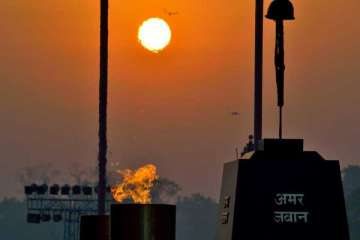What is Amar Jawan Jyoti? Why is controversy looming over a war memorial
The existence of Amar Jawan Jyoti was questioned two years ago after the National War Memorial came into being and the nation got a new eternal flame there. Back then, the Indian Army had stated that Amar Jawan Jyoti will continue as it is an "inseparable" part of the country's history.

Controversies surround Amar Jawan Jyoti after the Centre announced that the eternal flame will be extinguished after 50 years and will be merged with the flame at the adjoining National War Memorial (NWM) in the run-up to Republic Day.
Congress accused the BJP government of "removing history" by extinguishing the Amar Jawan Jyoti. Former Congress chief Rahul Gandhi hit out, saying some people cannot understand patriotism and sacrifice, and added that the Congress will light the Amar Jawan Jyoti once again.
"It is a matter of great sadness that the immortal flame for our brave soldiers will be extinguished today.Some people cannot understand patriotism and sacrifice - never mind...We will once again light the 'Amar Jawan Jyoti' for our soldiers," Gandhi said in a tweet in Hindi.
While Congress leader Manish Tewari alleged that extinguishing the flame tantamounts to removing history.
"Extinguishing Amar Jawan Jyoti tantamounts to extinguishing history. For it commentates sacrifice of those 3,483 brave soldiers who cleaved Pakistan into two parts and redrew map of South Asia post partition," he said on Twitter.
None of the war martyrs names present
However, government sources maintained there is a lot of misinformation on the matter, and said the flame of the Amar Jawan Jyoti is not being extinguished but is being merged with the flame at the National War Memorial.
Government sources said it was an odd thing to see that the flame at Amar Jawan Jyoti paid homage to the martyrs of the 1971 and other wars but none of their names are present there.
The names inscribed on the India Gate are of only some martyrs who fought for the British in the World War 1 and the Anglo Afghan War and thus is a symbol of our colonial past, the government sources said.
They said the names of all Indian martyrs from all the wars, including 1971 and wars before and after it are housed at the National War Memorial. Hence it is a true homage to have the flame paying tribute to martyrs there, they added.
BJP leader Sambit Patra also echoed the government view in a tweet. Patra said, "It is ironic that people who did not make a National War Memorial for seven decades are now making a hue and cry when a permanent and fitting tribute is being made to our martyrs".
ALSO READ | Amar Jawan Jyoti, burning at India Gate since 1971, to be merged with National War Memorial flame
What is Amar Jawan Jyoti?
The eternal flame known as Amar Jawan Jyoti was built in 1972 underneath the India Gate arch to commemorate the soldiers martyred in the Indo-Pak War of 1971. It is a memorial symbolised by an inverted bayonet and soldier's helmet over it with an eternal flame burning beside it.
The India Gate memorial was built by the British government in memory of the British Indian Army soldiers who lost their lives between 1914-1921. However, the Amar Jawan Jyoti was included in the memorial structure in the 1970s after the massive victory of India over Pakistan in which 93,000 troops of the enemy country surrendered.
The existence of Amar Jawan Jyoti was questioned two years ago after the National War Memorial came into being and the nation got a new eternal flame there. Back then, the Indian Army had stated that Amar Jawan Jyoti will continue as it is an "inseparable" part of the country's history.
Earlier, tri-services chiefs and visiting delegates used to pay respect at the Amar Jawan Jyoti. Even on all important days like Republic Day and Independence Day, tri-services chiefs used to pay respect at Amar Jawan Jyoti.
But with the new eternal flame at the National War Memorial and wreath-laying ceremony on all designated days being carried out at the memorial, the force will now merge the Amar Jawan Jyoti with the other.
The National War Memorial was built in memory of all soldiers and unsung heroes who laid down their lives defending the nation since Independence.
It is spread over 40 acres in the India Gate complex behind the canopy, and is dedicated to soldiers killed during the Indo-China War in 1962, Indo-Pak Wars in 1947, 1965 and 1971, Indian Peace Keeping Force Operations in Sri Lanka and in the Kargil Conflict of 1999, besides those killed in the UN peacekeeping missions.
After a long wait and multiple considerations, the National War Memorial was built in the India Gate complex by the Narendra Modi government and was inaugurated in 2019.
After the inauguration of the building in War memorial, all military ceremonial events were shifted to it from the India Gate memorial. The National War Memorial has the names of all the Indian defence personnel who have lost their lives in different operations from the 1947-48 war with Pakistan to the Galwan valley clash with Chinese troops. The names of troops who lost lives in the counter-terrorist operations are also included on the walls of the memorial.
ALSO READ | Amar Jawan Jyoti 'not being extinguished', say govt sources amid Opposition's criticism